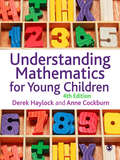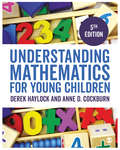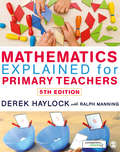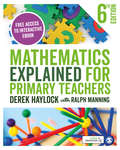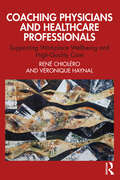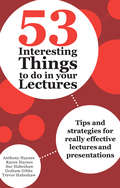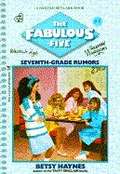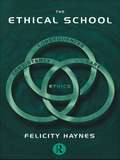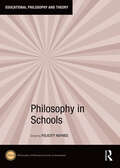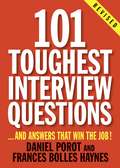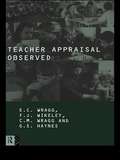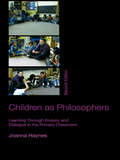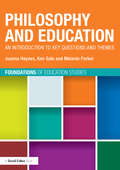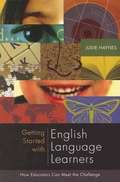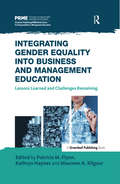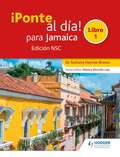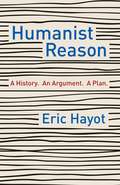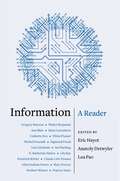- Table View
- List View
Understanding Mathematics for Young Children
by Derek Haylock Anne CockburnIf you are a teacher or student teacher in a nursery or primary school, you need a secure understanding of the mathematical ideas behind the material you will use in the classroom. To help young children develop their understanding of mathematics, you need to develop your own understanding of how mathematics is learnt. <P><P> In this indispensible book, the authors help you to understand mathematical concepts and how children come to understand them, and also help develop your own confidence with mathematical activities. <P> Each chapter of this book includes:<P> - Real-life examples and illustrations from children and teachers in the classroom <P> - The research behind some of the concepts and teaching approaches discussed <P> - Pauses to reflect and discuss your own mathematical knowledge and experience <P> - Age-appropriate classroom activities to try with your class or group.
Understanding Mathematics for Young Children: A Guide for Teachers of Children 3-7
by Derek Haylock Professor Anne CockburnHaving a deep understanding of the mathematical ideas and concepts taught in the classroom is vital as a nursery or primary school teacher. In order for children to get to grips with these concepts, trainee teachers need to be aware of how they come to interpret and understand them. Now in its 5th edition, this essential book helps trainee teachers develop their own knowledge of key mathematical ideas and concepts for the nursery and primary classroom. Now focusing specifically on ages 3-7, it also supports trainees with several age-appropriate classroom activities. As well as updates to further reading suggestions and research focuses, this revised edition includes new content on: Mastery in learning mathematics Simple fractions Roman numerals Money as a form of measurement
Understanding Mathematics for Young Children: A Guide for Teachers of Children 3-7
by Derek Haylock Professor Anne CockburnHaving a deep understanding of the mathematical ideas and concepts taught in the classroom is vital as a nursery or primary school teacher. In order for children to get to grips with these concepts, trainee teachers need to be aware of how they come to interpret and understand them. Now in its 5th edition, this essential book helps trainee teachers develop their own knowledge of key mathematical ideas and concepts for the nursery and primary classroom. Now focusing specifically on ages 3-7, it also supports trainees with several age-appropriate classroom activities. As well as updates to further reading suggestions and research focuses, this revised edition includes new content on: Mastery in learning mathematics Simple fractions Roman numerals Money as a form of measurement
Mathematics Explained for Primary Teachers (Mathematics Ser.)
by Derek Haylock Ralph ManningGet access to an interactive eBook* when you buy the paperback! (Print paperback version only, ISBN 9781446285879) A Unique Blend of Digital and Print Learning Resources! 5 Star student reviews: "A must have for teachers-to-be, especially those who are a bit shaky on their maths knowledge!" "Not many maths books keep me fixated but this is one that is definitely worth the money." "It is a book I will be using even when in the classroom." Mathematics Explained for Primary Teachers develops your understanding of mathematical concepts and processes, and how children learn them, so you can confidently teach mathematics to primary children. Tried and tested, the fifth edition of Derek Haylock's much loved textbook matches the 2014 curriculum requirements for England. Every chapter integrates children's learning, classroom practice, and teacher's own requirements for subject knowledge, making this the ideal text to guide you through your studies and beyond. More than just a book! The new edition is supported by FREE access to an interactive eBook and a companion website allowing you to use a wealth of teaching and learning resources. You can use the eBook to study where and when you want, and read, annotate and search the book on a tablet, laptop or PC. You can also visit study.sagepub.com/haylock5e to access: Videos by the author introduce core themes of each section and explain key mathematical processes. Links to the National Curriculum specify the statutory requirements for primary schools in England that relate to the mathematical content of each chapter. Learning and Teaching points highlight important issues you may face in the classroom and provide practical guidance for teaching. Self-assessment questions help check your understanding and provide immediate feedback to see how well you have done. Select SAGE journal articles to support literature reviews and wider reading. Lesson Plan Activities by Ralph Manning support content-focused chapters and contain creative mathematics tasks across the primary age range. A Student Workbook is also available to accompany this book, including over 700 practice problems to help you understand, apply and teach primary mathematics. Derek Haylock is an education consultant and writer with a background in mathematics teaching, teacher education and classroom-based research in mathematics education. Ralph Manning is an independent consultant in primary education. He has worked as a primary teacher and as a lecturer in primary teacher education for 18 years, following a career in IT. *interactivity only available through Vitalsource eBook
Mathematics Explained for Primary Teachers
by Derek Haylock Ralph ManningTo help teachers confidently teach mathematics in primary school, this book develops their understanding of mathematical concepts and processes and how children learn them. This sixth edition of Derek Haylock's popular book has been updated to highlight mastery approaches to teaching mathematics and how to apply these in the classroom. Every chapter integrates children's learning, classroom practice, and teacher subject knowledge, making this the ultimate primary mathematics resource for teacher training and beyond. Online resources accompanying the book include: An interactive ebook, carefully integrating video, activities and questions with book chapters Expanded and enhanced downloadable lesson plans for use in the classroom Revised solution videos taking readers through key concepts step-by-step Revised and reworked professional development tasks to extend teachers further
Mathematics Explained for Primary Teachers
by Derek Haylock Ralph ManningTo help teachers confidently teach mathematics in primary school, this book develops their understanding of mathematical concepts and processes and how children learn them. This sixth edition of Derek Haylock's popular book has been updated to highlight mastery approaches to teaching mathematics and how to apply these in the classroom. Every chapter integrates children's learning, classroom practice, and teacher subject knowledge, making this the ultimate primary mathematics resource for teacher training and beyond. Online resources accompanying the book include: An interactive ebook, carefully integrating video, activities and questions with book chapters Expanded and enhanced downloadable lesson plans for use in the classroom Revised solution videos taking readers through key concepts step-by-step Revised and reworked professional development tasks to extend teachers further
Coaching Physicians and Healthcare Professionals: Supporting Workplace Wellbeing and High-Quality Care
by Veronique Haynal René ChioléroThis important volume applies the practice of professional coaching to the hospital setting specifically, imparting the authors’ rich experience of coaching healthcare providers to other coaches working within the field. The book details how coaches can tailor their skills to the complex world of the modern hospital where physicians, nurses, medico-technical staff, managers, and administrators must carefully coordinate their efforts to be successful in high-stakes situations. It moves through the various stages of coaching, starting from the initial contact with management to the different applications of individual and team coaching, addressing common client issues including failing leadership, crisis, conflict, violence, and burnout. Each chapter includes clinical vignettes and theoretical ideas supported by field-specific research and literature. The book’s final reflection proposes changes to be considered to improve the functioning of hospital care teams, job satisfaction of healthcare professionals, and, ultimately, patient outcomes. Coaching Phsycians and Healthcare Professionals is essential reading for professional coaches and mentors active in the hospital setting, as well as coaches in training, consultants, and all hospital professionals.
53 Interesting Things to do in your Lectures: Tips and strategies for really effective lectures and presentations
by Anthony Haynes Karen Haynes Sue Habeshaw Graham Gibbs Trevor HabeshawLectures remain a staple form of teaching in higher and professional education, yet presenting doesn't come naturally to most of us. 53 Interesting Things to do in your Lectures provides practical suggestions, each tried and tested, for developing really effective lectures and presentations across all disciplines.The authors cover the full presentation process, from structuring the lecture, to use of illustrations and technology, techniques to attract and sustain student attention, active learning strategies, and dealing with questions.Whether you're new to lecturing and training and keen to develop good presentation technique, or more experienced and looking to expand your repertoire, 53 Interesting Things to do in your Lectures is a handy guide to keep on your desk.
Katie's Dating Tips (The Fabulous Five #12)
by Betsy HaynesWILL KATIE'S TIPS FOR DATING BACKFIRE? Jana Morgan, Melanie Edwards, Beth Barry, Christie Winchell, Katie Shannon... they're The Fabulous Five. They started out as a club whose secret purpose was to keep up with snobby Taffy Sinclair. Now these five best friends are in the seventh grade--are they ready for the ups and downs of junior high? When Katie Shannon notices that her mother has been spending more and more time at home alone, she's determined to put some excitement into her mother's life. And when Mrs. Shannon begins teaching a course at Wakeman Junior High, Katie gets her chance. She gives her mother all kinds of tips about dating, and soon Mrs. Shannon has a date with an English teacher from school. But will he turn out to be Mr. Right...or all wrong?
The Kissing Disaster (The Fabulous Five #7)
by Betsy HaynesCAN MELANIE WIN FRIENDS WITH KISSES? Jana Morgan, Melanie Edwards, Beth Barry, Christie Winchell, Katie Shannon ... they're The Fabulous Five. They started out as a club whose secret purpose was to keep up with snobby Taffy Sinclair. Now these five best friends are in the seventh grade--are they ready for the ups and downs of junior high? THE KISSING DISASTER When the other members of The Fabulous Five seem too busy to have time for her, Melanie starts feeling left out. To get attention, she decides to prove how popular she is, and she manages to get two of the cutest boys in the seventh grade to kiss her. Word spreads like wildfire. Laura McCall, her rival, couldn't be more jealous, and Melanie couldn't be happier--until disaster strikes. Now, instead of being popular, no one at school will go near her! Will Melanie ever have friends again?
Seventh-grade Menace (The Fabulous Five #14)
by Betsy HaynesCAN JANA STOP THE SEVENTH-GRADE MENACE? Jana Morgan, Melanie Edwards, Beth Barry, Christie Winchell, Katie Shannon ... they're The Fabulous Five. They started out as a club whose secret purpose was to keep up with snobby Taffy Sinclair. Now these five best friends are in the seventh grade--are they ready for the ups and downs of junior high? SEVENTH-GRADE MENACE Jana Morgan thinks she's the luckiest girl at Wakeman Junior High. Not only is she dating cute Randy Kirwan, but she and Randy are competing in a popularity contest together. Soon the votes are pouring in, but Jana's also getting attention of a different kind. First chocolate milk is poured all over her petitions for the contest. Then she discovers that catsup has been squirted into her locker. Jana suspects that seventh-grade bully Geena McNatt is responsible, and she's ready to retaliate ... until something happens to make Jana see why Geena is always such a menace.
Seventh-grade Rumors (The Fabulous Five #1)
by Betsy HaynesTHE FABULOUS FIVE HAS FANTASTIC COMPETITION! Jana Morgan, Melanie Edwards, Beth Barry, Christie Winchell, Katie Shannon ... they're The Fabulous Five. They started out as a club whose secret purpose was to keep up with snobby Taffy Sinclair. Now these five best friends are in the seventh grade, are they ready for the ups and downs of junior high? SEVENTH-GRADE RUMORS When Jana Morgan and the rest of the gang arrive at Wakeman Junior High for the first day of school, they discover that another group of girls has taken over their private hangout. Jana has heard rumors about these girls who call themselves The Fantastic Foursome, and she doesn't expect to become friendly with any of them. But soon she finds herself really liking one of the members of the rival group, and the rest of The Fabulous Five think she's a traitor. Can Jana prove to her old friends that rumors aren't always based on the truth?
The Trouble with Flirting (The Fabulous Five #2)
by Betsy HaynesMELANIE HAS THREE PROBLEMS - BOYS, BOYS, BOYS! Jana Morgan, Melanie Edwards, Beth Barry, Christie Winchell, Katie Shannon... they're The Fabulous Five. They started out as a club whose secret purpose was to keep up with snobby Taffy Sinclair. Now these five best friends are in the seventh grade-are they ready for the ups and downs of junior high? THE TROUBLE WITH FLIRTING When Melanie Edwards finds seven tips for flirting with boys in a teen magazine, she can't resist trying them out. The rest of The Fabulous Five think that Melanie has gone totally boy crazy, but Melanie insists she's only having fun-until the flirting works too well. Now, she's juggling three boyfriends, and what's worse, one of them thinks she is someone else!
The Ethical School: Consequences, Consistency and Caring
by Felicity HaynesConflicts often arise between regulations, making it difficult for school management teams and teachers to resolve situations with appropriate dignity and respect for all concerned. This book discusses provocative actual case studies to help teachers to reflect on their own ethics, guiding them to make more reasonable decisions in their schools, and thereby gradually transforming schools into more cohesive and caring communities. A model of consequences, consistency and caring, each aspect based on traditional ethical theories provides a scientific base - a rational and a responsive base for ethical decision-making. This work covers such everyday problems as censorship, inclusivity, school uniform, punishment, personal gain and confidentiality, and argues that care and respect for others, equity, rational autonomy and concern for long-term benefits are more important for a school community than short-term power and control.
Philosophy in Schools (ISSN)
by Felicity HaynesIn 1972, Matthew Lipman founded the Institute of Advancement for Philosophy for Children (IAPC), producing a series of novels and teaching manuals promoting philosophical inquiry at all levels of schooling. The programme consisted of stories about children discussing traditional topics of ethics, values, logic, reality, perception, and politics, as they related to their own daily experiences. Philosophy for Children has been adapted beyond the IAPC texts, but the process remains one of an open community of inquiry in which teachers promote respect, conceptual clarity, critical judgement, and active listening without imposing their own ideas. Philosophy in Schools describes the successes and difficulties in implementing this community of inquiry model. The book covers topics including the formation of non-didactic courses in ethics, the difficulties of fitting a post-compulsory philosophy course into a standard curriculum framework, and the political assumptions of adopting this model in a low socio-economic school. The contributions also ask deeper questions about how a genuine community of inquiry model is incompatible with conventional models of schooling, with their positioning of the discipline of philosophy in the curriculum. This book was originally published as a special issue of Educational Philosophy and Theory.
101 Toughest Interview Questions: And Answers That Win the Job!
by Frances Bolles Haynes Daniel PorotNothing is more crucial to landing your dream job than a stellar performance in the all-important interview, that nerve-wracking final step to every job search. Extensively updated and revised for today's highly competitive employment market, this compact, concise handbook will prepare you for the most challenging and frequently asked questions you can expect to encounter. Following each question is a list of savvy, can't-miss sample answers, which can be easily modified to reflect your own experience level, skills, and qualifications.
Teacher Appraisal Observed
by G. Haynes Felicity Wikely E. C. Wragg Prof E WraggSystems for the appraisal of teachers have been in place since 1992, bringing with them considerable controversy. How effective are they? What does this mean for the classroom teacher? This major new study, led by Ted Wragg, uses as its basis information gathered from all 109 Local Education authorities, 658 primary and secondary teachers and 479 appraisers. Teacher appraisal is examined from the perspectives of all those concerned and at all levels. The main focus of the study is on teacher competence in the classroom, which lies at the heart of school effectiveness and improving pupils' achievement. Through the use of a variety of methods including intensive case studies, the book provides a unique insight into the quality of classroom practice and teacher appraisal today, what it means for those involved and how to use this knowledge to move on from this point.
Children as Philosophers: Learning Through Enquiry and Dialogue in the Primary Classroom
by Joanna HaynesSince the publication of the first edition of Children as Philosophers in 2002 there has been an enormous growth of interest in philosophy with children. This fully revised second edition suggests ways in which you can introduce philosophical enquiry to your Personal, Social and Health Education and Citizenship teaching and across the curriculum. The book demonstrates children’s capacities to engage in sophisticated processes of dialogue and enquiry about a wide range of issues and underlines the importance of listening to children’s ideas. The author discusses the pleasures and challenges for adults in managing discussion and responding to children's claims to knowledge in the philosophical arena. The author also addresses the well-established Philosophy for Children movement, developed in the USA and Australia and links this to the principles of Every Child Matters. This fascinating book is an invaluable resource for all teachers and trainees seeking a thoughtful and contextualised introduction to the theory and practice of philosophical enquiry with children, including: expanded discussion on children’s voice and participation at school the theory and practice of dialogical approaches to teaching and learning new evidence of the educational impact of philosophy with children in the classroom what should inform the professional choice of resources for teaching philosophy wider international debates about learning styles, skills and intelligence. New reports are presented from children, teachers, from the fields of Gifted and Talented and Special Needs Education and from international research carried out over the last five years.
Philosophy and Education: An introduction to key questions and themes (Foundations of Education Studies)
by Joanna Haynes Ken Gale Melanie ParkerWritten specifically for education studies students, this accessible text offers a clear introduction to philosophy and education. It skilfully guides readers through this challenging and sometimes complex area bringing key philosophical ideas and questions to life in the context and practice of education. There is also a companion website to accompany the book, featuring live weblinks for each activity which can be visited at www.routledge.com/cw/haynes. The authors consider the implications of educational trends and movements through a variety of philosophical lenses such as Marxism, utopianism, feminism and poststructuralism. The book explores enduring themes such as childhood and contemporary issues such as the teaching of critical thinking and philosophy in schools. Features include: a range of individual and group activities that invite questioning and discussion case studies and examples from a variety of formal and informal education settings and contexts reference to philosophically informed practices of research, reading, writing and teaching suggestions for further reading in philosophy and education overviews and - and key questions for each chapter Drawing on readers’ experiences of education, the book reveals the connections between philosophical ideas and educational policy and practice. Part of the Foundations in Education Studies series, this timely textbook is essential reading for students coming to the study of philosophy and education for the first time.
Getting Started with English Language Learners: How Educators Can Meet the Challenge
by Judie HaynesIn Getting Started with English Language Learners: How Educators Can Meet the Challenge, Judie Haynes provides a practical resource to help educators who are new to the field of English as a Second Language understand the needs of English language learners. From learning how students acquire a second language to differentiating instruction to exploring practical strategies for teaching newcomers, this book will help educators learn how to create effective learning environments for English language learners.
Integrating Gender Equality into Business and Management Education: Lessons Learned and Challenges Remaining
by Kathryn Haynes Patricia M. Flynn Maureen A. KilgourThis volume addresses the need to integrate gender equality into business and management education and provides examples of leading initiatives illustrating how this can occur from various disciplinary and global perspectives. Gender inequality has a long history in business schools and the workplace, and traditions are hard to change. Some disciplines remain resolutely gendered, affecting both women and men; and case materials on women leaders and managers are still rare.The chapters provide conceptual and research rationales as to why responsible management education must address the issue of gender equality. They also identify materials and resources to assist faculty in integrating gender issues and awareness into various disciplines and fields. These include specific case studies and innovations that assess or address the role of gender in various educational environments.The book is designed to help faculty integrate the topic of gender equality into their own teaching and research and gain support for the legitimacy of gender equality as an essential management education topic. This is the first book in a series on gender equality as a challenge for business and management education, published with the Principles of Responsible Management Education (PRME) Working Group on Gender Equality.
¡Ponte al día! para Jamaica Libro 1 Edición NSC
by Tashane Haynes-BrownIncrease your ability to communicate with Jamaica's Spanish-speaking neighbours and visitors with an accessible secondary Spanish course which blends a vicarious immersion experience with the familiarity of the Jamaican cultural context. - Trust experienced local authors and reviewers to guide you through Jamaica's National Standards Curriculum.- Boost motivation with culturally relevant texts structured into units and divided into mini lessons for ease of learning and access.- Navigate skills confidently with objectives listed according skills: listening & speaking, reading, writing and vocabulary & grammar.- Advance conversation and listening skills with audio resources on CD and conversation practice in each unit. - Engage in independent further study with a digital component supported by Languagenut, containing additional reading, writing, speaking & listening activities.
¡Ponte al día! para Jamaica Libro 1 Edición NSC
by Tashane Haynes-BrownIncrease your ability to communicate with Jamaica's Spanish-speaking neighbours and visitors with an accessible secondary Spanish course which blends a vicarious immersion experience with the familiarity of the Jamaican cultural context. - Trust experienced local authors and reviewers to guide you through Jamaica's National Standards Curriculum.- Boost motivation with culturally relevant texts structured into units and divided into mini lessons for ease of learning and access.- Navigate skills confidently with objectives listed according skills: listening & speaking, reading, writing and vocabulary & grammar.- Advance conversation and listening skills with audio resources on CD and conversation practice in each unit. - Engage in independent further study with a digital component supported by Languagenut, containing additional reading, writing, speaking & listening activities.
Humanist Reason: A History. An Argument. A Plan
by Eric HayotAsk just about any humanist, and you will hear that the humanities are in a crisis. Facing utilitarian approaches to education, the corporatization of the university, plummeting enrollments, budget cuts, and political critiques from right, left, and center, humanists find themselves on the defensive. Eric Hayot argues that it is time to make a positive case for what the humanities are and what they can become.Hayot challenges scholars and students in the humanities to rethink and reconsider the work they do. Examining the origins of the humanist ethos in nineteenth-century Germany and tracing its philosophical roots back to Immanuel Kant, Hayot returns to the history of justifications for the humanities in order to build the groundwork for their future development. He develops the concept of “humanist reason” to understand the nature of humanist intellectual work and lays out a series of principles that undergird this core idea. Together, they constitute a provocative intellectual and practical program for a new way of thinking about the humanities, humanist thought, and their role in the university and beyond. Rather than appealing to familiar ethical or moral rationales for the importance of the humanities, Humanist Reason lays out a new vision that moves beyond traditional disciplines to demonstrate what the humanities can tell us about our world.
Information: A Reader
by Hayot, Eric; Detwyler, Anatoly; Pao, LeaFor decades, we have been told we live in the “information age”—a time when disruptive technological advancement has reshaped the categories and social uses of knowledge and when quantitative assessment is increasingly privileged. Such methodologies and concepts of information are usually considered the provenance of the natural and social sciences, which present them as politically and philosophically neutral. Yet the humanities should and do play an important role in interpreting and critiquing the historical, cultural, and conceptual nature of information.This book is one of two companion volumes that explore theories and histories of information from a humanistic perspective. They consider information as a long-standing feature of social, cultural, and conceptual management, a matter of social practice, and a fundamental challenge for the humanities today.Information: A Reader provides an introduction to the concept of information in historical, literary, and cultural studies. It features excerpts from more than forty texts by theorists and critics—including Walter Benjamin, Umberto Eco, Lisa Gitelman, Ian Hacking, N. Katherine Hayles, Friedrich Kittler, and Norbert Wiener—who have helped establish the notion of the “information age” or expand upon it. The reader establishes a canonical framework for thinking about information in humanistic terms. Together with Information: Keywords, it sets forth a major humanistic vision of the concept of information.
